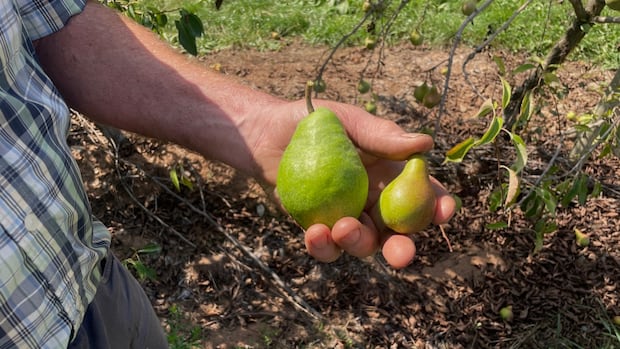Apart from one summer in the late 1990s, Peter Elderkin says he can’t recall there ever being a growing season quite this dry in Nova Scotia.
“We’ve never seen anything quite as severe as this,” said Elderkin who runs Elderkin’s Farm Market, Bakery & U-Pick in Wolfville.
“This is unheard of.”
Elderkin says this summer’s drought conditions have had major impacts on his orchards, particularly when it comes to the size and colour of the fruit they produce — two of the most important characteristics that determine whether a piece of fruit can be sold or not.
The farm, which has been in his family for generations, grows apples, pears, peaches, plums, cherries and more.
He told CBC in a recent interview that volume has been down “dramatically” this year, and it remains to be seen how much of the product will be marketable.
Elderkin has irrigated his crops in the past, which is a costly and labour-intensive process. But due to mobility issues, he was not able to irrigate this season, meaning his trees have had to make do with the historically little rain that has fallen over the Annapolis Valley this summer.
Down the road at Noggins Corner Farm, which grows apples, pears and other fruit, owner Andrew Bishop has a team of four employees focused on irrigation.
They have 33 pumps and three overhead irrigation guns running at any given time. They’re drawing water from several ponds on the property, four to five of which have already dried up.

He said the situation is “unprecedented,” as it’s the first time they’ve ever had to irrigate their main apple crop, which is no small feat.
Bishop estimates it takes about 1,500 to 2,000 litres of fuel just to keep the equipment running.
“You can do the math. You know how much it costs to fill your car,” Bishop said.
He only has capacity to irrigate about half of his fruit trees, which span about 182 hectares of land.
In addition to reduced volume and potential loss in revenue, both Elderkin and Bishop are concerned about how much stress the trees are under.
A number of trees at both farms can be seen wilting and defoliating, which will likely impact how much fruit the tree can produce next season and beyond.

Emily Lutz, executive director of the Nova Scotia Fruit Growers’ Association, says this is a widespread concern, particularly at farms near South Mountain where the soil is rockier and can’t absorb as much water.
Lutz said some trees may ultimately die as a result of this summer’s drought and will need to be replaced altogether.
“You’re actually losing not just the tree, but the potential productive value of that tree over the next 10, 15, 20 years depending on the lifespan of an orchard,” she said.
“This prolonged period of dryness has put most of our crop in jeopardy. So [I’m] hearing from growers that upwards of potentially 50 per cent of some of their crops are unsaleable, or too small, or under-coloured, or sunburnt,” said Lutz.
Nova Scotia’s Minister of Agriculture Greg Morrow recently visited farms across the province, and has been meeting with groups like Perennia Food and Agriculture Corporation and the Nova Scotia Federation of Agriculture to get a grasp on how this drought has impacted the industry.
In a statement at the end of August, Morrow said he directed his department to collaborate with commodity groups to host outreach sessions for farmers, to give them an opportunity to ask questions and learn about existing support programs.
“Farmers are the backbone of communities across the province. They create jobs, support families and grow the food we need to grow and thrive,” Morrow said in the statement. “I want to assure you that this is the beginning of our work.”
He said he’s also asked his team to reach out to the federal government to identify what options for immediate assistance are available.
Elderkin, Bishop and Lutz agree that the provincial department needs to continue its work on programs that support farmers, because the industry is only becoming more unpredictable due the increasing frequency of extreme weather events.
Elderkin and Bishop say they will have to look at investing in more ways to help them mitigate the impact of climate change.

But they say although much of the fruit at Elderkin’s and Noggin’s is not up to par this year, there’s still plenty of fresh fruit to be picked and enjoyed.
The farmers are encouraging Nova Scotians to participate in the U-pick season, and support local as much as possible.







